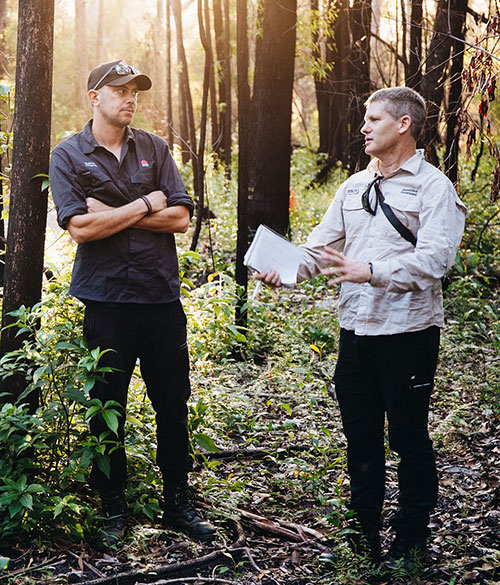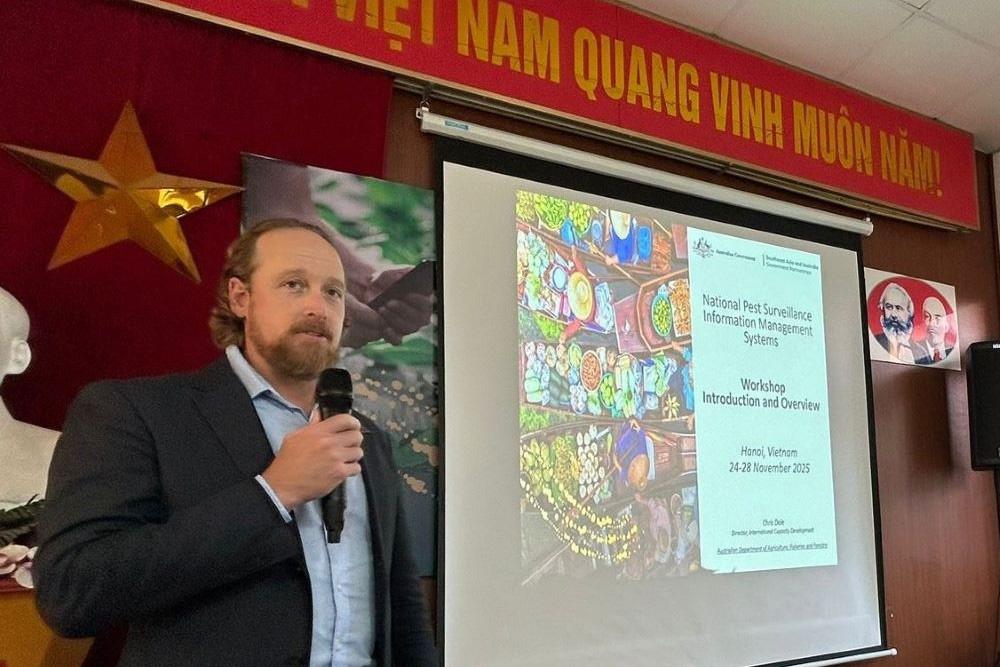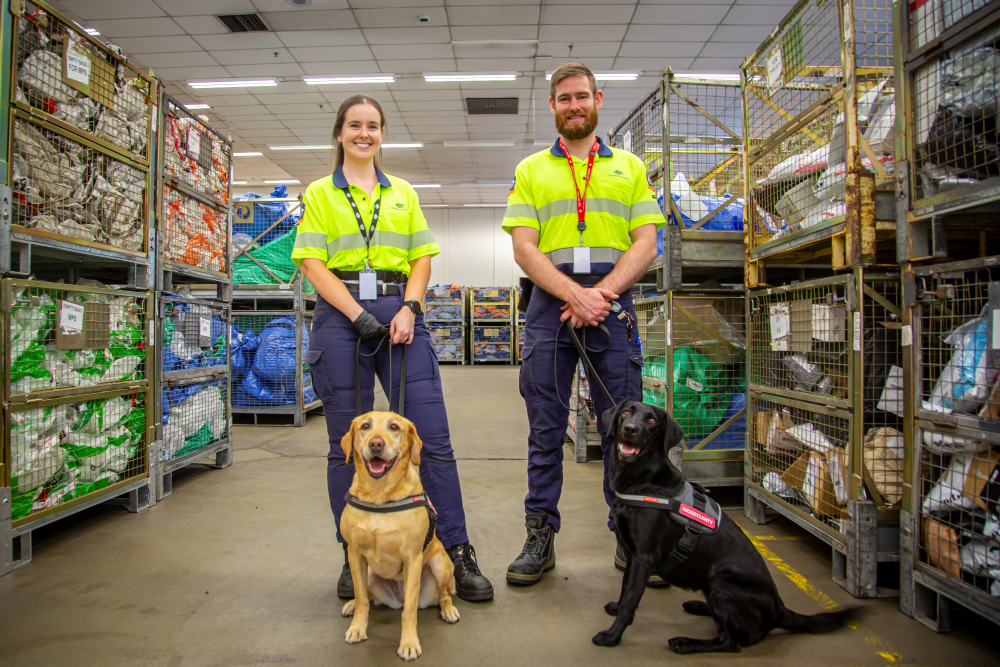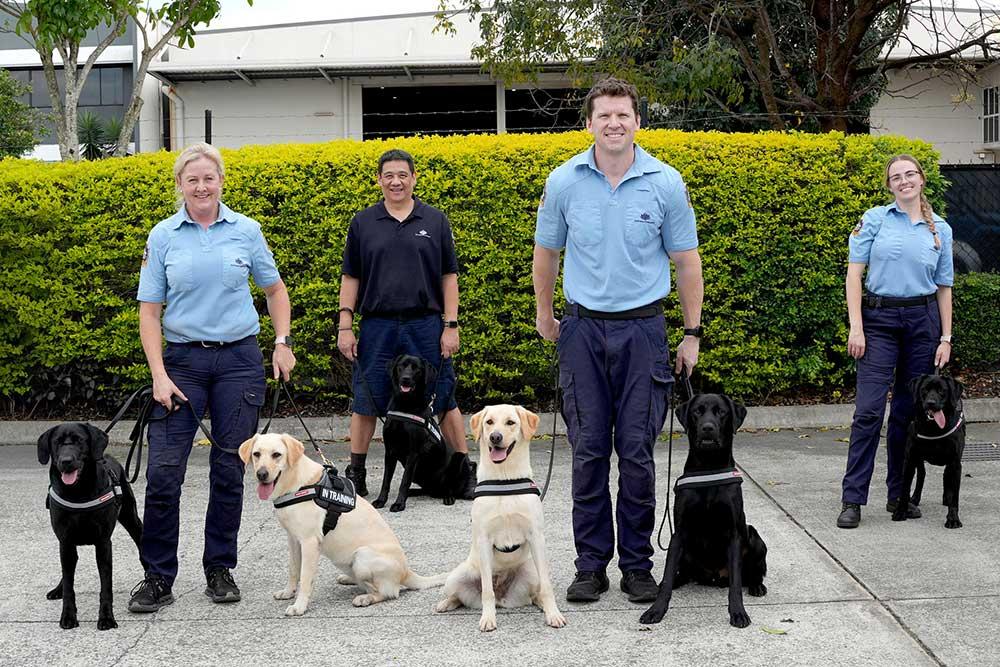Dr Geoff Pegg and Aj Perkins
Through thoughtful collaboration and partnership, Dr Geoff Pegg and Aj Perkins have brought together a diverse network of stakeholders to deliver a transformative 2-year environmental biosecurity program, funded by the Environmental Biosecurity Project Fund.
The program focused on training and capacity building to protect culturally significant species and places from the threat of exotic environmental pests and diseases. Together, they laid the foundation for a more skilled, connected and resilient approach to environmental protection.
The initiative focused on northern New South Wales (Coffs Harbour), south-east Queensland (K’gari and Bunya Mountains) and Cairns. They partnered with Australian and state government agencies, Plant Health Australia, Indigenous communities in the region and other key stakeholders to raise awareness of the vital roles played by Indigenous Rangers, natural resource management organisations and other land managers in safeguarding Australia’s unique ecosystems.
The program included developing and delivering training modules for Indigenous Rangers and land managers to improve their ability to spot and report biosecurity threats. Participants included Butchulla Aboriginal Corporation, Bunya Peoples’ Aboriginal Corporation, Coffs Harbour Aboriginal Land Council, Gumma Indigenous Protected Area and Minyumai Indigenous Protected Area staff. The training focused on myrtle rust, strengthening forest health skills and environmental biosecurity in managing Country.
The training materials addressed key forest health and environmental biosecurity topics and were tailored to the priorities and concerns of the community. The workshops were an opportunity to share technical information and learn practical skills for identifying and monitoring myrtle rust and other exotic pest and pathogen threats.
Dr Pegg and Aj Perkins engaged a range of stakeholder groups to highlight the cultural and ecological importance of Myrtaceae, and forests in general, and the essential role Indigenous knowledge plays in developing management strategies. This is vital because First Nations groups manage over 50% of Australia’s National Reserve System.
The team built a groundbreaking trans-Tasman partnership in Indigenous forest health and environmental biosecurity with Māori custodians and scientists from New Zealand (Aotearoa). This collaboration led to a cultural exchange involving:
- Butchulla and Gumbaynggirr Rangers
- Māori participants from the Rotoiti 15 program
- scientists from SCION research
- officers from our department and the New South Wales and Queensland governments.
Representatives from the SCION-led Myrtle Rust Jobs for Resistance program – Te Rātā Whakamaru visited Australia. This cross-cultural collaboration, funded by Catalyst Seeding from the Royal Society of New Zealand, created a partnership that transcends domestic and international borders to combine different cultural ways of working. It was the first initiative of its kind, providing a model for managing exotic pests and diseases that highlights the interconnected impacts on Country, people and culture.
The program produced the short film Roots of Resilience, a moving testament to the enduring cultural significance of Australia’s natural forests to First Nations people. The film highlights the urgent need for collective action to protect these important ecosystems for future generations.
Through genuine engagement with Indigenous perspectives and a shared commitment to environmental protection, Dr Pegg and Aj Perkins have shown that the most effective biosecurity outcomes are achieved through collaboration. As evidence of its impact, the project has been extended until 2029, ensuring that this important work in environmental protection will continue.
Watch a video about their work
Introduction
This is the accessible text transcript of the 2025 Australian Biosecurity Awards winner video featuring Dr Geoff Pegg and Aj Perkins.
Transcript
I’m Geoff Pegg, Senior Principal Forest Pathologist with the Queensland Department of Primary Industries. And I’m Aj Perkins, Senior Project Officer with Department of Climate Change, Energy, Environment and Water.
I’d like to start off by just acknowledging Country, we’re here on Bundjalung Country at the moment. But also I’d like to acknowledge Country in all of the places that we’ve been to and the participants in their community and acknowledge their Elders.
This project has taken a number of years to come together and really came on the back of myrtle rust arriving in Australia, and we realised that there really wasn’t an Indigenous voice, and not much of an environmental voice when it came to managing the threat that myrtle rust posed.
This project is really aimed at bringing together groups working with Indigenous Rangers from Queensland and New South Wales to try and protect our ecosystems and our native forests. It’s opened my eyes in terms of the consequences and the potential impacts of these pests and diseases.
It’s not just a dying tree. Just the connection to Country that goes with having to deal with these threats.
It’s really changed my perspective on how we should be looking at environmental biosecurity.
We really appreciate this award. Recognition of all the hard work that’s gone on.
It’s the Ranger teams, the relationships we’ve built with the Ranger teams over the years.
We’ve got a long way to go.
Hopefully this award identifies opportunities for not only for us to further the work we’re doing, but also other groups to open up other doors, to work in a similar space.
We’re excited to continue to work with the Rangers into the future and continue to grow this project.
I’d like to thank those who nominated us, as well as the Queensland, New South Wales and Australian Government with the support on the project.
Thanks again for the award.
Really looking forward to continuing this work into the future, and wanted to really just dedicate that award to all of the Rangers as a real testament to the work that they’ve put in.
Photos




